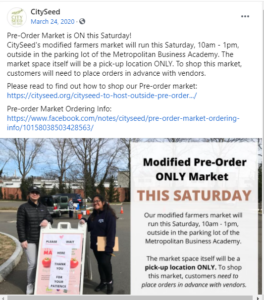Final report for ONE20-368
Project Information
CitySeed has put in place state-of-the-art software and electronic systems for Farmers Market management. With the COVID-19 pandemic, however, we identified the need to further adapt, creating an online ordering platform to ensure farmers can continue to participate in pre-order/pick-up Farmers Markets, connect to customers seeking fresh food, and grow their sales during the current crisis and beyond. Through this project, we researched and evaluated over 10 online ordering platforms. Over the course of five vendor meetings, at least 6 one-on-one meetings and eight vendor surveys, we worked with market farmers to determine the best system for both market and farmer needs. It was determined that all of the vendors had worked quickly at the start of the pandemic to be able to offer online sales and they did not have the capacity to learn and build a new system this year. It was decided to delay the implementation of a unified, market wide program. Towards the end of the project, Farmspread introduced a point of sale system that could be used for online, pre-order sales. Given the markets current use of Farmspread's market management programs, we will implement the online and point of sale system in the near future.
In place of a unified online pre-order system, CitySeed created a website for customers, presenting the pre-order instructions for each vendor. This system was monitored by tracking farmer sales and customer counts throughout the pandemic and compared to sales and counts before the pandemic. Our goal was to build capacity among farmers in our network to connect with customers through online sales. We found that out of seven farms attending a comparable number of markets in 2020 as they did in 2019, 5 farms saw an increase in sales. Customer counts did not rise, however, customers were asked to send only one person to the market, likely resulting in lower customer counts. CitySeed determined that online sales platforms are a useful and needed solution in time of crisis, when social distancing is required for public safety and health, and a sustainable solution to increase farmer sales both on-farm and at our Farmers Markets during normal times.
CitySeed conducted project outreach to customers, farmers, and partner organizations through email newsletters, social media, listserves, and on our website. At least three partner organizations shared the information through their own newsletters, over 800 individuals accesses our newsletters weekly, and our average social media reach was over 1200 views per post.
In light of the current COVID-19 pandemic, this project sought to pilot test an upgrade of our Farmers Market systems and processes to implement an adapted Farmers Market model that incorporates all social distancing precautions, and creates a pre-order and pick-up option to increase farmer sales and ensure customers have safe access to local produce and products. Specifically, our project sought to (1) research current software and technology for online ordering, and create a centralized online ordering platform for CitySeed Farmers Markets; (2) build capacity of farmers to install and use this new system; (3) adjust Farmers Market layout and on-the-ground systems and processes based on continued surveying of customers and vendors, as well as and input from partners at the City of New Haven; (4) facilitate farmer exchanges on streamlining packing and distribution processes, and other methods to increase sales during this challenging time; and (5) capture a new base of customers that are looking for efficient and safe ways to procure their produce and other grocery items, both during the pandemic and beyond.
Farmers Markets across the State of Connecticut, and across the nation, are closing or adapting new models of operation due to the spread of COVID-19. Farmers Markets, although officially deemed an ‘essential service’ (similar to a grocery store) by the State of Connecticut, must also operate under city-level health department and city permitting requirements related to meeting public health precautions that slow the spread of COVID-19. To date (4.14.20), New Haven has confirmed 710 cases of coronavirus and Connecticut has confirmed 13,381 cases, and these numbers are expected to increase throughout April/May 2020. Annually, CitySeed works closely with about 60 vendors—half of whom are CT farmers—through our network of five Farmers Markets. Due to this public health emergency, farmers in our network are currently adjusting crop plans and struggling to identify safe routes for distribution of their product, particularly in urban centers, in order to keep up sales and keep their businesses viable.
CitySeed sees the current crisis as both a major challenge and an opportunity for creative adaptation to better serve CT farmers in our network during this pandemic, and long after it has passed. The primary problem we aim to solve through this project is: how do we maximize CT farmer sales and continue to grow farmers’ customer bases while operating under current crisis conditions? And further, how can we adapt our market systems in ways that will sustain CT farmers' growth after the crisis has abated?
We believe that the effects of this pandemic, and operating under social distancing constraints, will last for some time, and may reoccur. CitySeed sees an opportunity within this challenging setting to adapt our Farmers Market management systems and support CT farmers to adapt and take advantage of current technology for online ordering and pickup, delivery, or aggregation. Doing so would maximize farmers’ sales at our Farmers Markets and create opportunity for increased on-farm sales as well.
Our proposed solution to the stated problem is two-fold:
(1) build on the quick adaptation we have already made by researching and rolling out across all vendors effective software systems that allow customers in Greater New Haven to pre-order directly from farmers and secure a staggered pickup slot at CitySeed Farmers Markets;
(2) streamline an adapted, safe Farmers Market that includes the following measures: appropriate vendor spacing; personal protective equipment; recommended hand washing and disinfection provisions; elimination of cash transactions; a streamlined, one-way drive/bike/walk-through option; time-spaced customer pickup slots to meet City requirements; and relevant outreach to all involved to ensure behavioral precautions are followed.
With funding to support implementation and continual evaluation with customers and vendors of this proposed solution, we believe we can fully adapt and implement a Farmers Market that increases farmer sales and customer base during this crisis, and can result in sustainable economic growth for farmers once the current crisis subsides. Our results can be utilized as a case study for other Farmers Markets across the country looking to also boost farmers markets sales in the wake of COVID-19.
Cooperators
- - Producer
- - Producer
Research
In order to build the capacity among farmers in our network to connect with customers through online sales, we have taken the following steps:
1 – Regularly surveyed farmers regarding their current pre-order and online sales capability. Conducted approximately 6 surveys over 3 months, averaging a 75% response rate. Surveys were taken through Google Forms.
2 – Regularly surveyed customers regarding their preferences related to online shopping or pre-ordering platforms. Conducted approximately 4 surveys over 2 months, with 50-90 responses per survey. Surveys were conducted through Google Forms, distributed through email and linked in our weekly newsletter, as well as one Instagram story poll.
3 – Hired a summer (June-August) intern to further research online sales platforms currently on the market, especially those geared towards farms and farmers markets. This research was done to build upon and organize the research multiple CitySeed staff members had already been conducting since the start of the pandemic.
4 – Held 3 Market Advisory Committee meetings and 2 All Vendor Meetings throughout the Spring, as well as at least 6 one-on-one meetings to discuss the feasibility of modified market models and options for online sales and pre-ordering.
5 – CitySeed developed a pre-order, drive through farmers market model, allowing customers to pre-order from vendors and pick up during a designated time slot. This system was developed and implemented in March and adjusted as needed when market locations changed. This model of market ran for 15 total weeks, running through June 2020, before the model shifted to socially distanced and on site shopping resumed.
6 – Tracked vendor sales and customer counts for comparison against 2019, when modified market models and online ordering were not utilized. We compared data from the "Wooster Square" farmers market, from the first week in April through June, when the market model began to allow for on site shopping. We also compared data for the 13 weeks following the switch. We did not include the last 2 weeks of the "Winter" market, which were the first 2 weeks of pre-order only, in order to try to limit variables (different locations, different vendors).
1 – Surveyed farmers regarding their current pre-order and online sales capability.
Farmer Surveys (3/13 Vendor Pre-order Questionnaire, 3/28 Vendor Survey, 4/13 Future of Markets Survey, 5/9/20 Vendor Survey, 6/2 Vendor Survey, 2020 Vendor Survey)
- Measured farmers interest in offering pre-orders and online sales, their ability to offer customers online pre-ordering or an online store, their ability to take credit or debit payment through their websites or over the phone, and their ability to accept credit or debit payments in person.
- We also requested the specific information that customers would need in order to place any orders, such as, website addresses, phone numbers, emails, accepted payment methods and when ordering opens and closes.
Farmer Survey Findings
- The majority of vendors had the ability to accept online or over the phone credit card payments. Less than 5 could not accept payments at the time of the survey. (3/17 Vendor Survey)
- Vendors worked quickly to set up online shopping options for their customers. The platforms most used were Square Stores and Local Line.
- Pre-order markets and maintaining online stores is very arduous on farmers. (3/28 Survey)
- Setting up an online store takes days of work and hours per week to maintain inventory; time farmers do not have.
- Learning new technology is an obstacle.
- Organizing, prepping, and packaging pre-orders adds additional work hours, increases staffing needs and creates storage and transportation issues for farms.
- Having to maintain multiple online platforms posed an issue when estimating inventory availability.
2 – Surveyed customers regarding what they would prefer of an online shopping or pre-ordering platform.
Customer Surveys (3/21 Customer Survey, 3/28 Customer Survey, 5/9 Customer Survey, 5/30 Customer Survey)
- Measured their overall experience of attending the previous week’s market, if they felt comfortable and safe in that model of market, if they would participate again in that type of market and the factors contributing if they said no, if they experienced any issues at the market, and any comments they may have.
- Measured the effectiveness of the pre-order, drive through market by asking their assigned time slot, when they actually arrived and when they completed their pick up.
Customer Survey Findings
- Customers expressed a strong preference for a unified online sales market, where they can shop from all market vendors with a single check out process.
- Customers appreciated the efforts and safety of having a drive through, pre-order only market, but would rather be able to shop onsite.
- Customers pointed out some shortcomings of the pre-order only market model:
- SNAP benefits cannot be used online
- Not everyone has access to the internet, computers or smartphones to place orders or sign up for a pick up time slot.
- Not everyone has a car (this was corrected by allowing walk up time slots)
3 – Researched online sales platforms currently on the market, especially those geared towards farms and farmers markets.
Online Sales Platforms Research (Research & Webinars)
- Extensive research into over a dozen online sales platforms that may work for farms and farmers markets.
- Research methods included attending over 8 webinars, numerous hours of website research and conversations with at least 3 service providers.
- Research began at the start of the pandemic and continues still
- We found the platforms that seemed to meet most of our needs of farmers were prohibitively expensive.
- We shared our research with farmers who were interested, though most had already chosen a method of online sales.
4 – Held 3 Market Advisory Committee meetings and 2 All Vendor Meetings, as well as at least 6 one-on-one meetings to discuss the feasibility of modified market models and options for online sales and pre-ordering.
- Regularly consulted with the Market Advisory Committee to determine the safest market models, given the COVID-19 pandemic, that would have either a minimally negative effect or possibly a positive effect on vendor sales.
- Assisted multiple vendors with set up of Square Store sites and reviewed sites for usability by customers.
- Connected vendors to each other so they could discuss how they are managing their sales.
- Developed a system to allow SNAP customers to pre-order from vendors but pay onsite at the market, through CitySeed with their EBT card, as well as increased SNAP incentives for customers and adjusted the program to simplify their use with farmers.
5 – CitySeed developed a pre-order, drive through farmers market model, allowing customers to pre-order from vendors and pick up during a designated time slot.
- Due to the urgent, immediate need for farmers and markets to adjust their way of doing business, many farmers developed or purchased the online platform that worked best for their individual business. In order to serve as much of the community as quickly and as safely as possible, CitySeed responded by creating a website where market customers could find vendor pre-order information in one location.
- While creating a quick fix, it does not meet customers expectations or desires for a singular online shopping platform where they can easily order from all vendors in one online trip. The use of this website and customers' experience with it does provide a good baseline for comparison once a single platform is in place.
- To run the pre-order, drive through the market in an efficient and orderly manner, we asked customers to sign up for a designated time slot for their pick up time. We utilized the Sign Up Genius website for this. Through this, we were able to manage the length of each time slot, the number of people allowed to sign up per time slot and it gave us the opportunity to know who was in our market space at any given time, satisfying city and state contact tracing requirements.
6 – Tracked vendor sales and customer counts for comparison.
- Out of 36 markets, 5 modified markets in 2020 exceeded the attendance counts from the corresponding week in 2019.
- Overall, the 2020 season saw 14,388 less people than 2019.
- 5 out of 11 farms reported sales increases in 2020 from 2019.
- One produce farmer saw sales increase by $35,000, with no change in the number of markets attended from 2019.
- Another producer saw sales increase by $14,000, attending only 1 additional market compared to 2019.
- Two other produce farmers saw sales increase by $2,500-$4,000, despite attending 1-2 fewer markets than in 2019 and a fruit farmer saw an almost $3,000 increase, despite attending 3 less markets than 2019.
- 6 out of the 11 farms reported sales decreases in 2020 from 2019.
- One farm reported a decrease of only $155 and attended the same number of markets as in 2019.
- Four farmers who showed significant loss of sales attended significantly less markets (8-24 fewer) than in 2019 and experienced a $6,377 to $14,154 decrease in market sales.
- A meat vendor who remained strictly pre-order only and did not engage in onsite sales, saw a sales decrease of about $9,000, with no change in the number of markets attended compared to last year.
- Comparing the 5 farms that attended roughly the same number of markets in 2019 and as during both the Pre-Order Market (Weeks 1-13) and the following Socially Distanced Market (Weeks 14-26) in 2020, we found that
- The weeks of pre-order markets brought in $2,280 more in sales than the following weeks that included on site shopping.
- Additionally, in 2019, market weeks 14-26 experienced a large ($15,000) sales increase over weeks 1-13, compared to the slight decrease in 2020.
- 2021 saw the return of the large jump in sales in the second half of the market season, indicating that the decrease in 2020 is likely an anomaly due to the pandemic.
With the start of the COVID Pandemic in March 2020, CitySeed quickly began to investigate and evaluate options to keep providing farmers with the opportunity to sell their products, despite the future of farmers markets being unknown. We researched online sales platforms and surveyed vendors and customers, to see what might work. Given the need to make quick, business altering decisions, many farmers developed or purchased their own online sales platforms. CitySeed then decided to keep researching options while doing our best to support the farmers.
We developed a pre-order, drive through style of market and provided customers with a website offering our vendors pre-order information. Though it was not ideal for anyone, it worked and farmers were able to sell their goods and customers could access fresh fruits, meats and vegetables. In July 2020, based on the data we collected from both vendors and customers, we switched back to a modified, shop onsite market. Pre-ordering was still allowed and encouraged, though the number of orders did dwindle as people began to leave their houses more and COVID numbers decreased.
Based on our research, surveys and sales evaluations, we have determined that while there is a time and place for pre-order markets, it is not the preferred market model of customers or vendors. The decrease in sales experienced when the market added on site shopping shows that people were likely not yet ready to be in "social" settings. This supports our notion that markets should, at the very least, be ready to implement a pre-order system at any time, should it be needed.
Though we researched many good online sales platforms, Farmspread/Marketspread, the organization that CitySeed currently uses for market management, has recently added an online sales platform/POS for vendors and markets. We have not yet to begun implementing it, but we are working with the company to do so. Using this platform takes away vendor concerns of having to learn yet another system, since they are already accustomed to using it for the markets.
Education & Outreach Activities and Participation Summary
Participation Summary:
For this project, thus far, we have conducted outreach through surveying farmers, vendors and customers. We have shared those findings, as well as the research we have gathered on online sales platforms, with farmers. We also consulted with farmers as needed, to help them determine what system would work best for them at the market and overall.
Our modified market plans and pre-order system information was disseminated through the CitySeed newsletter twice a week, each averaging 887 opens, and through multiple social media posts per week (Modified Market Soc Med Boosts), averaging about 1295 views per post. Through email, we reached out to our partner organizations, City organizations such as the New Haven Food Policy Council, the Office of Elderly Services and the Board of Alders, all sharing the market information in their newsletters.
We will also be disseminating our results to the Connecticut farmers market social media group, on CT Food System Leaders listserv, the Farmers Market Coalition’s listserv (which has an active COVID-19 group) and on our website.
Learning Outcomes
The need to quickly switch to an online selling system was very eye-opening for many of our farmers. Some were able to smoothly make changes since they were very knowledgeable with the capabilities their current systems had to offer. They are also very versed in computer programs and the internet. Other farmers did not possess that skill set and needed some help. Through our vendor meetings and one-on-one meetings, we were able to help all farmers learn about the different online platform options available to them (and continue to do so). Through these meetings, we were also able to connect farmers using the same systems to one another. This gave them resources and knowledge bases to draw from to help get their systems in place and to help troubleshoot any glitches they experienced. Connecting the farmers with each other helped ease the isolation and concern many were feeling - they weren't in it alone.
As we presented information about various online sales platforms to the vendors, they expressed gratitude for the information and our efforts. However, they did not report a desire to begin using any of them, citing the time and effort it takes to learn systems, build sites, load in inventory and manage it all. In turn, CitySeed learned that any type of online sales platform used, would need to be simple to learn, easy to manage and, ideally, already in use by the majority of the farmers.
Project Outcomes
Our project did not have the projected outcomes we may have hoped for, but it did help us better understand our farmers, how they do business and what their capacities are. Although we initially began with the reasoning that a unified online sales platform would reduce burdens on farmers and increase their sales, we learned the majority of them were lacking the capacity for additional operational changes (having gone through so many already). This is understandable and given the fact the system we had quickly put into place was working, we did not feel it was appropriate to further burden vendors with a new system.
It is significant to note that the only farm who attended the same number of markets both pre and post pandemic and saw a significant loss of income, was the only farm who continued to sell via pre-order only, throughout 2020, and allowed for minimal on site sales. This farmer also remained pre-order only, allowing minimal onsite sales, in 2021. They again experienced a decrease in sales, selling almost $5,000 less than they did in 2020. Almost all other farms tracked saw increased sales in 2021 from 2020, ranging from $2,000 to $6,000 with a few seeing increases over $15,000 up to over $30,000.
These findings, coupled with customer survey results, lead us to believe that a unified online market sales platform will not help increase sales at a market that can also allow onsite shopping. However, we do believe that a unified online sales platform is important for markets to have already in place for times when onsite shopping is not a possibility. We would suggest markets try to plan in advance, working with their farmers, to find the right platform that serves the market, the farmers and the customers the best, and be ready to put it into action should the need arise.
Customers have made it clear that they would prefer to shop in person to pick out what they are buying. The timing of implementing a unified online sales platform should be considered. Ideally, it should be planned with significant advanced warning and planning, so that farmers have time to adjust. The speed at which everyone was forced to adjust to pandemic restrictions did not allow time for such a system to be chosen and implemented; each farmer had to immediately adopt whatever system could work for them and their capacity. Online and pre-orders create an extensive amount of additional work for farms and their staff. They now must constantly manage inventory and their order system (website, emails, etc). Then they must package orders and safely transport them as needed. "Managing pre-order sales only has added at least 4 hours of work to the already long work day," said Four Root Farm owner, Rachel Berg.
CitySeed's approach to this project was appropriate, however, timing was not on our side. When the pandemic hit, everyone immediately did what they needed to do to keep their businesses going, including farmers and farmers markets. In writing for this grant, we held hope that we would be able to find and implement a streamlined, unified online sales platform to increase farmers sales and provide customers with an easy, safe way to shop. Our research was well received by vendors whose capacity was already strained by the rapid system changes brought on by COVID. . Farmers had already quickly set up their own pre-order and online stores, using what worked best for each business at the time. Farmers expressed that they were finally accustomed to their new systems and were not interested in changing systems again so soon.
Holding off on utilizing a unified online system allowed for two things: the ability to conduct further research and with time, finding the system that we believe will work best for our market in the near future. Many of the online sales platforms are very new. Some were around for a short time before the pandemic, and others arose out of the need for such platforms due to the pandemic. We were able to learn about different features each offered and determine which features best suit our needs as a market and the needs of our vendors and customers. Thankfully we did not rush into anything, as the program we use for market management, Farmspread/Marketspread, developed a Point of Sale and online ordering system, which will help our vendors keep everything organized and limit the number of programs they need to learn and use.
Although the outcome was not completely what we initially hoped for, we do not see this as a failure, but more of a side effect of the pandemic. This was a good project to embark on and we will continually add to the research, so it is ready and available as people need it.
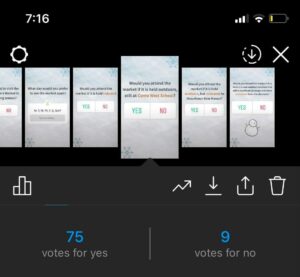
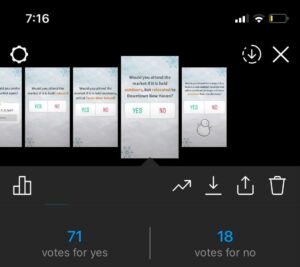 .
. 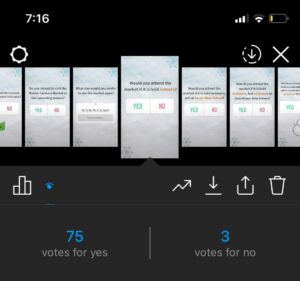 .
. 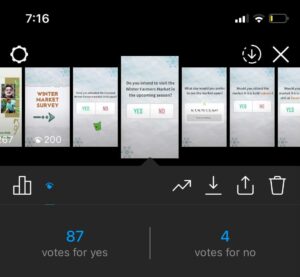 .
. 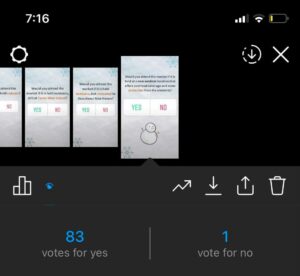 .
. 
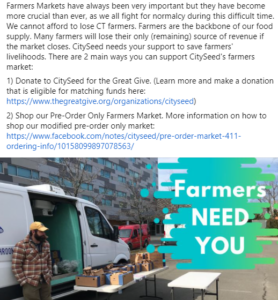 .
.